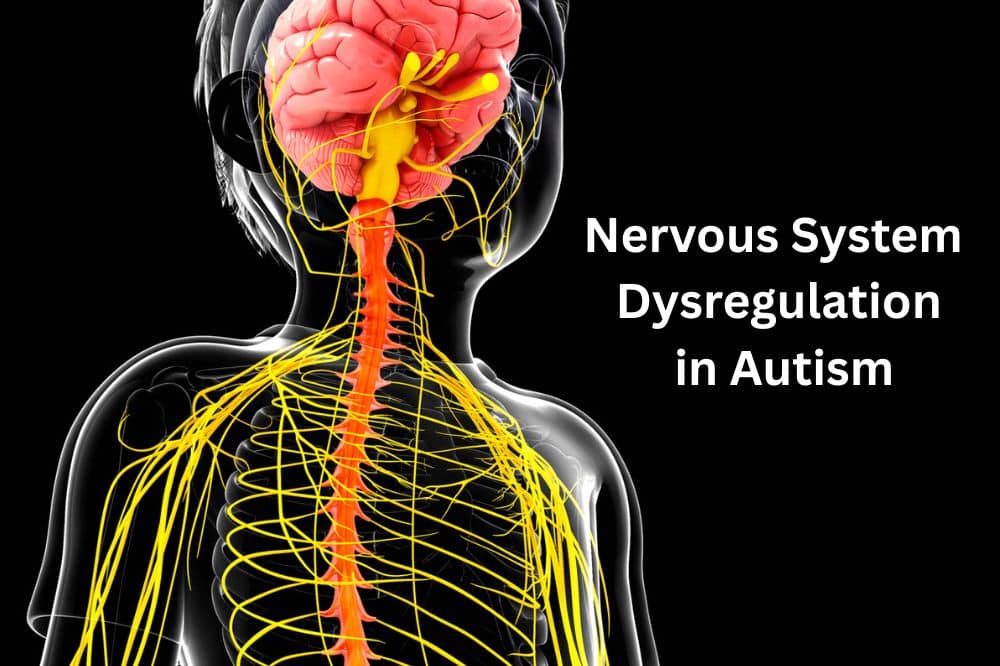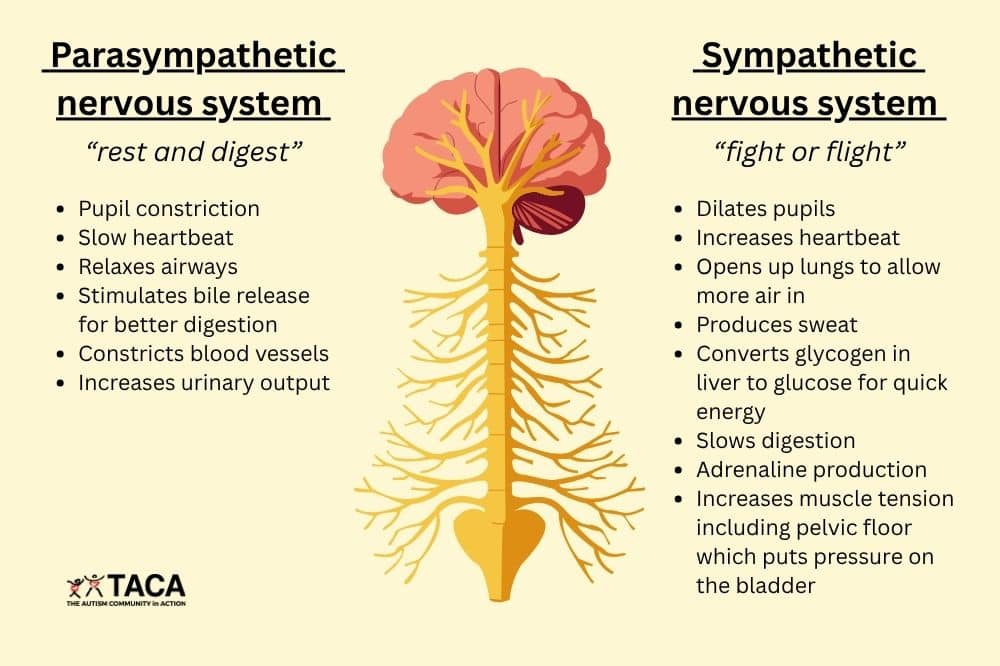Nervous System Dysregulation in Autism

All contents of this resource were created for informational purposes only and are not intended to be a substitute for professional advice, diagnosis, or treatment. Always seek the advice of your physician, therapist, or other qualified health providers with any questions or concerns you may have.
When a child is stuck in fight or flight mode, they cannot rest, digest, or heal. As a parent of a child with autism, you’re probably already aware that autism affects more than just communication and social interactions. There’s a growing body of research exploring how the nervous system and the immune system are deeply connected, especially in children with autism. Understanding how these systems impact each other may help explain some common challenges your child experiences, such as sensitivity to stress, frequent sickness, or behavioral changes. Let’s break down these ideas in simple terms.
This article will discuss:
- What is Nervous System Dysregulation
- Physical Symptoms of Nervous System Dysregulation
- Emotional and Cognitive Symptoms of Nervous System Dysregulation
- How the nervous system affects the immune system
- The immune system and autism
- How Can Parents Help?
The nervous system is a complex network of nerves, the brain, and the spinal cord that controls our actions and how we interpret sensory information. Therefore, it affects everything from how we move to how we feel.
What is Nervous System Dysregulation?
The autonomic nervous system controls involuntary functions like heart rate, breathing, digestion, and more.
It’s made up of two main parts: the sympathetic and parasympathetic systems.
- The sympathetic system is what prepares our body for “fight or flight.” It’s what kicks in when we’re stressed, raising our heart rate, speeding up our breathing, and getting our muscles ready to respond to danger.
- The parasympathetic system helps us relax, rest, and digest food. Think of it as the “calm down” button after the “panic” button has been pressed.
In children with autism, there is often something called sympathetic overdrive or nervous system dysregulation, meaning the “panic” button is pressed more often than it should be.
This can happen because the body is more sensitive to certain things—sounds, lights, textures, or even emotions!
When the sympathetic system is stuck in overdrive, it can lead to feeling stressed or anxious all the time, even when there’s no real danger, affecting cellular energy production, which fuels every process in the body. The research of Dr. Robert Naviaux on Cell Danger Response provides further insight into this issue.

Physical Symptoms of Nervous System Dysregulation:
- Changes in appetite or weight
- Headaches
- Muscle pain
- Fatigue
- Insomnia or sleep disturbances
- Nausea, vomiting, diarrhea
- Heart palpitations or racing heart
- Dilated pupils
- Tremors or shaking
- Sensitivity to noise, light, or touch
- Blood sugar dysregulation
Emotional and Cognitive Symptoms of Nervous System Dysregulation:
- Anxiety or panic attacks
- Irritability or mood swings
- Difficulty concentrating or focusing
- Memory problems
- Depression
- Easily overwhelmed
- Difficulty regulating emotions
How the Nervous System Affects the Immune System
The immune system is the body’s defense against illness. It fights off infections like colds and flu. But did you know that when the body is stressed (like during sympathetic overdrive), it can make the immune system weaker?
When the nervous system is constantly in “fight or flight” mode, the body releases stress hormones like cortisol. While these hormones are helpful in short bursts, if the body stays in this state for too long, it can wear down the immune system. This means your child may get sick more often, struggle with inflammation, or experience more severe allergiesand gut issues.
In children with autism, nervous system dysregulation and immune system problems seem to go hand-in-hand. You might notice that your child’s behaviors or sensory sensitivities worsen when they’re sick. This isn’t just a coincidence—there’s a real connection between the two systems.
The Immune System and Autism
Research shows that many children with autism have immune system abnormalities. Some studies suggest that their immune systems may be more prone to inflammation, meaning the body stays in a state of “high alert” even when it doesn’t need to be. This could explain why some children with autism are more sensitive to environmental triggers like food, chemicals, or even stress.
When the immune system is overactive or out of balance, it can affect brain function and behavior. This is why you might notice changes in your child’s mood, focus, or sensory sensitivity when they’re dealing with an illness or even mild inflammation.
How Can Parents Help?
While the relationship between the nervous system, the immune system, and autism is complex, there are ways to support your child’s overall health:
Focus on calming activities
Help your child engage in activities that activate the parasympathetic system, like deep breathing, gentle exercise, or spending time in nature. These can help calm the nervous system and reduce stress.
Reduce Stress
Try to remove sources of stress for your child. Because our kids are so emotionally connected to their parents, simply changing your own body language to be more open and engaging can reduce stress.
Find your child’s joy
Discover the healthy, calming activities your child enjoys and expand on those. People who do what they love are rarely stressed. Gardening and growing food, going on walks, swinging in the park, doing puzzles, creating art, and listening to music are all good examples of calming activities.
Reduce screen time
Screen time should be limited for numerous reasons. First, tablet time is excitatory to the brain. Secondly, screen time negatively affects the body’s natural cortisol cycle by triggering your child’s fight or flight mode. Lastly, screen time causes hyperarousal of the brain, which suppresses the brain’s frontal lobe, the area responsible for impulse control and mood regulation. Consider replacing the screen with something else like an MP3 player or YOTO player.
Prioritize sleep
Sleep is crucial for both the nervous and immune systems to function well. Establishing a calming bedtime routine can improve sleep quality, which in turn supports your child’s ability to manage stress and stay healthy. See the TACA article titled “Sleep Issues in ASD” to learn how to address poor sleep.
Consider nutrition
A healthy diet rich in fruits, vegetables, and foods that reduce inflammation (like omega-3 fatty acids) can support both the nervous system and the immune system. Some children with Autism may have allergies or food sensitivities, so it’s worth exploring if certain foods trigger behavioral changes that may be associated with inflammation. Use this free downloadable Food Journal to track your child’s food reactions.
Work with a healthcare provider
If your child frequently gets sick or experiences immune-related issues, talking to a healthcare provider familiar with autism can help. They may recommend supplements, medications, therapies, or interventions that could balance both the nervous and immune systems.
Discuss supplements that help regulate cortisol with your doctor
Phosphatidylserine, ashwagandha, omega-3 fatty acids, magnesium, L-Theanine, vitamin C, chamomile, and Rhodiola rosea are a few examples of supplements to consider.
Conclusion
The link between the nervous system, immune system, and autism is important for understanding some of the challenges your child may face. By supporting your child’s nervous system and keeping their immune system in balance, you can help them feel calmer and healthier. Every child is unique, but a little bit of knowledge about these connections can go a long way in supporting their well-being.




